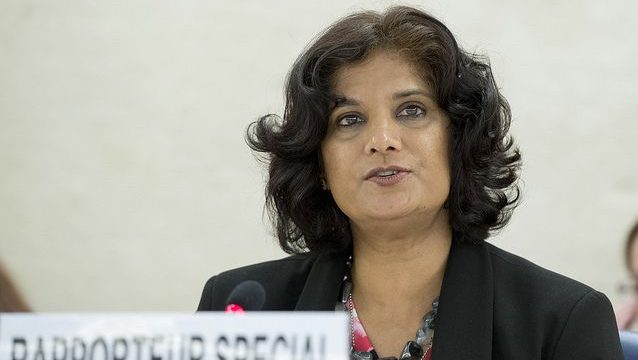Photo: Urmila Boola / Credit: UN OHCHR
India’s new anti-trafficking bill has significant flaws according to two UN experts who warn that the country must revise the legislation to bring it in line with human rights law.
Maria Grazia Giammarinaro, Special Rapporteur on trafficking in persons, and Urmila Boola, Special Rapporteur on contemporary forms of slavery, released a joint statement this week criticizing the bill’s weak support for trafficking victims.
Related Campaign: Help stop domestic slavery in Delhi.
“We are gravely concerned about the Bill as presented by the Government to the Indian Parliament on 18 July,” they write.
“Trafficking in persons is primarily a gross human rights violation. However, the Bill over-emphasises the criminal response and does not give due consideration to the rights and needs of victims and their effective protection and proper rehabilitation.”
The statement from the Office of the United Nations High Commissioner for Human Rights (OHCHR) also warns that the draft bill conflates several issues:
“The proposed Bill seems to promote ‘rescue raids’ by the police, and the institutionalisation of victims in the name of rehabilitation, rather than applying appropriate screening methods and standard operating procedures for the identification and referral of victims or potential victims of trafficking and social integration programs which are respectful of their rights.”
Other problematic aspects include an “over-broad and vague nature” of some of the Bill’s provisions, which could lead to blanket criminalisation of activities that do not necessarily relate to trafficking.
“We are also concerned that the Bill may conflate sex work with trafficking for the purpose of sexual exploitation, which is not in line with the Palermo Protocol definition.
“Similarly, the Bill seems to conflate trafficking and smuggling of migrants by adding the aggravated circumstance of ‘encouraging or abetting any person to migrate illegally into India, or Indians to some other country’.
This may lead to the criminalisation of all irregular migrants, including victims or potential victims of trafficking, who, because of a lack of safe, orderly and regular migration channels, are forced into the hands of smugglers or traffickers,” the experts stressed.
On top of this, Giammarinaro and Boola lament that two important provisions in previous drafts of the bill have not been carried over to its current form. These include requiring the central government to allocate a budget to the rehabilitation fund for victims of trafficking, as well as puting in place accountability mechanisms and a periodic revision of protection systems.
“We urge the Indian Parliament to revise the Bill in accordance with human rights law, including the OHCHR Recommended Principles and Guidelines on Human Rights and Human Trafficking, in consultation with civil society organisations, UN agencies and other relevant partners,” they conclude.
Take Action: Chip in to support our work against modern slavery.







Freedom United is interested in hearing from our community and welcomes relevant, informed comments, advice, and insights that advance the conversation around our campaigns and advocacy. We value inclusivity and respect within our community. To be approved, your comments should be civil.